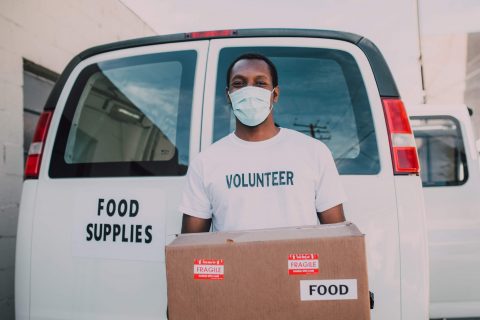6 Keys for Engaging Your Community
By Derek Lane, Washington Conference outreach ministries director and Maranatha pastor

In the familiar story of Jesus feeding the five thousand are six keys to engaging in community-based ministry. Let’s look at this story and its lessons!
The situation: Matthew 14 begins by recounting the gruesome story of John the Baptist being beheaded. It’s a sad and scary time for John’s followers and for Jesus and His disciples.
When Jesus heard what had happened, he withdrew by boat privately to a solitary place.
Lesson 1: Roles must be clarified
Jesus didn’t set out to feed five thousand people. He set out to retreat and rest from the turmoil.
When something happens in our society or community, the first task is to come away and rest. To do a heart check about why, how, what, and when to respond.
We need to understand in our response what is God’s responsibility versus ours. We can’t have this clarity when our thoughts are drowning out the Holy Spirit’s promptings.
While Jesus was in a retreat mode, he didn’t stay in a retreat mode. He used the recharge time to prepare for active ministry. This is a good example for us, too.
Hearing of this, the crowds followed him on foot from the towns, When Jesus landed and saw a large crowd, he had compassion on them and healed their sick.
Lesson 2: Needs must be identified
Jesus looked over the crowd and quickly identified the needs for community, for individual healing, and for collective healing.
Identifying needs can involve listening to stories or collecting data with the goal of understanding the heartbeat of a community. The question Jesus answered that we need to also ask is: “Where does it hurt?”
As evening approached, the disciples came to him and said, 'This is a remote place, and it's already getting late. Send the crowds away, so they can go to the villages and buy themselves some food.'
Lesson 3: Decisions must be unified
The disciples accessed the situation, saw that it was the “end of the day” or “end of the worship service,” if you will, and said it was time for church to be over. It was time to send people home after a full day of worship and healing. The disciples gave a practical, comfortable, and logical response to this unfortunate seeming circumstance: send people home.
For better or worse, they were unified in their response.
But Jesus looked over the crowd and had compassion. He saw opportunities to minister to people based on their needs, not our comforts. And Jesus also know that what we get out of ministry is what we put into it.
Jesus replied, 'They do not need to go away. You give them something to eat.'
'We have here only five loaves of bread and two fish,' they answered.
'Bring them here to me,' He said.
Lesson 4: The Mission must be magnified
Jesus dials in to the heart of the matter. We’re called to minister to the whole person. We don’t send people away. We invited them in. We give them something to eat from whatever resources we have available in the moment. We bring people to Jesus in prayer. And then we let the Holy Spirit work.
And he directed the people to sit down on the grass. Taking the five loaves and the two fish and looking up to heaven, he gave thanks and broke the loaves. Then he gave them to the disciples, and the disciples gave them to the people. They all ate and were satisfied, and the disciples picked up twelve basketfuls of broken pieces that were left over. The number of those who ate was about five thousand men, besides women and children.
Lesson 5: Resources must be quantified
As we begin meeting people needs within our community, we start with the resources we already have in hand. Maybe it is member skills. Maybe it is a physical environment like the church facility, parking lot, or front lawn. Maybe it is connections with a community partner. Maybe it is an excess of what we currently have or need. Maybe it is something small. Take a quick inventory: What do we have to offer? What do we have that will best help our community?
Take your identified resources and pray over them. Seek the Holy Spirit’s direction and blessing.
And looking up to heaven, he gave thanks and broke the loaves.
Lesson 6: The Master must be notified
Whenever we bring our measly offering to God, He will multiply our efforts. He wants to partner with us to give blessings above and beyond through us to our community. As we partner with Him, God is ready to give us basketfuls of extra blessings to continue sharing with the men, women, and children within our neighborhoods.
What is Jesus calling you to do in your neighborhood?
